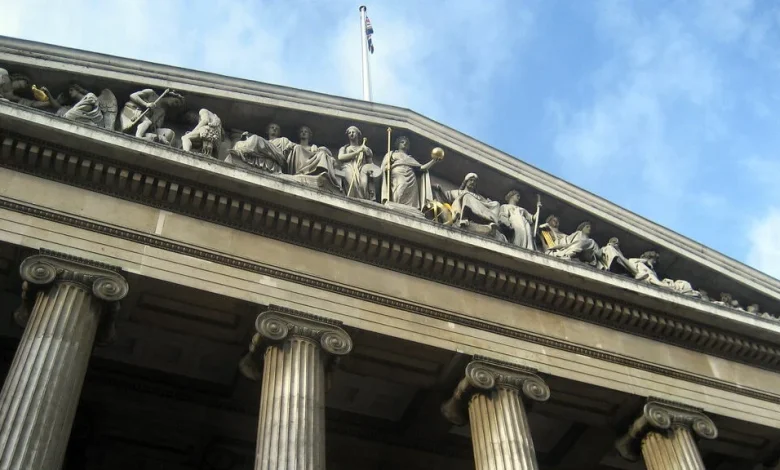British Museum dropped tobacco sponsor after query from Department for Health

The British Museum ended a 15-year partnership with a Japanese tobacco manufacturer months after an official from the Department of Health and Social Care (DHSC) questioned the deal.
The institution’s sponsorship arrangement with Japan Tobacco International (JTI) came to an end in September this year, it was revealed last week. The firm is behind cigarette brands such as Benson & Hedges, Camel and Silk Cut.
The UK Tobacco Industry Interference Index 2025, which tracks the influence of tobacco industry lobbying in the UK, reported on 11 November that the sponsorship deal was over.
The index said: “As of March 2025, the British Museum – non-departmental public body sponsored by the Department for Culture, Media & Sport (DCMS) – lists JTI as a corporate supporter on its website.
“During the timeframe of this index, the BM had repeated contact with JTI […] The authors of this report have heard via personal correspondence that the British Museum’s trustees have decided not to renew their partnership with JTI when the current arrangement ends in September 2025.”
References to the tobacco company were removed from the museum’s website the same day that the index was published.
Museums Journal understands that the decision not to renew was taken independently by the museum’s board of trustees after the partnership came to its natural end.
However the museum had faced questions earlier this year over the partnership. A Freedom of Information request submitted by the anti-fossil fuel pressure group Culture Unstained shows that the museum received at email from a civil servant at the Department for Health and Social Care (DHSC) at the beginning of the year asking to discuss the deal.
The civil servant’s email to the museum on 22 January said: “The British Museum’s corporate support from JTI has recently been highlighted to us by another team in the Department for Health […] We can discuss more about why this has come up on Tuesday…”
The email then asked the museum for more information about the support, its value, how it is reviewed and the projects funded by the tobacco firm.
The civil servant’s email was apparently prompted by public health expert Theresa Marteau, research professor emerita in behavioural science at the University of Cambridge, who wrote to the DHSC in January to warn that the British Museum partnership could be in breach of international obligations on tobacco control.
She has said that she wrote to the department “asking whether the British Museum’s acceptance of tobacco industry money contravened the UK government’s [Framework Convention on Tobacco Control] obligations given the museum is sponsored by a government department”.
Marteau says she was told that the Department for Culture, Media and Sport (DCMS) had no influence over the commercial deals of museums but that the matter would be raised with the museum.
“I don’t know what happened next, but it is most welcome news that the British Museum is no longer taking money from JTI,” Marteau has said.
The World Health Organisation’s Framework for Tobacco Control was ratified by the UK Government in 2004.
It expects signatories to “establish measures to limit interactions with the tobacco industry and ensure the transparency of those interactions that occur”, and to “denormalise and, to the extent possible, regulate activities described as ‘socially responsible’ by the tobacco industry, including but not limited to activities described as ‘corporate social responsibility’.”
Meanwhile DHSC guidance states that government organisations and their representatives should “not accept invitations to attend or support a reception or high-profile event sponsored by the tobacco industry”.
A DCMS spokesperson has described the claim that the decision was made as a result of government intervention as “categorically untrue”, the Art Newspaper reports.
“There are clear rules in place for all public authorities that prohibit sponsorship from certain industries, including tobacco,” the spokesperson told the publication.
“The decision to end the sponsorship period with a tobacco company was made by the British Museum’s board of trustees independently of the government.”
A spokesperson for the British Museum said: “We are grateful for the support provided by JTI and their sponsorship has now come to an end.
“The museum operates on public and private funding which ensures the magnificent collection remains free and accessible to the public for centuries to come.
“As a public body we have an obligation to ensure the long-term financial stability of the museum by securing funding from a number of sources. Their support enabled the museum to significantly increase accessibility and engagement with the collection for underrepresented adults.”
JTI was involved with the Community Partnership programme, which enabled the museum to “reach adults who may not otherwise have ever to the museum and engage them with the collection in an inclusive way”.
The sponsorship deal supported new volunteer-led Touch Tours for blind and partially sighted visitors, Deaf-led British Sign Language and audio-described tours, LGBTQ+ tours and tea parties for older and isolated individuals, as well as training for volunteers and our staff on access and equality.
According to the British Museum, JTI was also a long-term supporter of the museum’s Asia department, “helping visitors to explore Japanese culture from prehistory to modern times”.
JTI continues to sponsor the Royal Academy of Arts and the London Philharmonic Orchestra.
Nick Hopkinson, the chair of the public health charity Action on Smoking and Health, has called for DCMS to introduce a no-tobacco clause to Arts Council England funding.
“Given the government’s commendable action on smoking, it makes little sense for the tobacco industry to be allowed to piggyback on taxpayer funding by sponsoring, often with relatively small amounts, arts organisations that are supported by public funds,” he said.
The development has prompted fresh calls from environmental campaigners for the British Museum to rethink its sponsorship deals with the fossil fuel industry, including its 10-year, £50m partnership with BP.
“The health impacts of tobacco products and fossil fuel pollution are undeniable – and yet the only reason the museum seems to have ditched JTI is because they were forced to – even though the partnership clearly fell foul of tobacco regulation that has been in place for years,” said Sarah Waldron, co-director of Culture Unstained, which campaigns for ethical arts funding and against fossil fuel sponsorship of culture.
“How long will we have to wait for the museum to act on the evidence and drop BP?”
Culture Unstained is among a number of groups calling for a ban on fossil fuel sponsorship and advertising on public health grounds, similar to the restrictions on the tobacco industry.
Enjoy this article?
Most Museums Journal content is only available to members. Join the MA to get full access to the latest thinking and trends from across the sector, case studies and best practice advice.
Join





